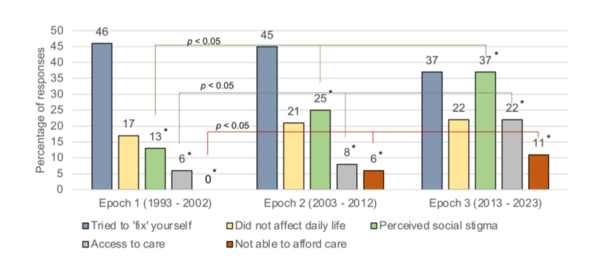Diagnosis and treatment delay in patients with OCD in the United States over the past three decades
(1) The Spence School
https://doi.org/10.59720/23-343
Obsessive-compulsive disorder is a mental health disorder that can lead to significant functional impairment and profound disability. Studies have shown that delayed diagnosis and treatment and prolonged duration of illness (DI, onset of symptoms to treatment) led to poorer patient outcomes. The purposes of this study are to investigate whether these time frames have improved over time and to identify reasons for delays. Our main hypothesis was that diagnosis delay, treatment delay, and DI have all improved over the past three decades. We grouped 182 participants into three epochs based on their onset of symptoms (epoch 1: 1992 – 2002, epoch 2: 2003 – 2012, epoch 3: 2013 – 2023). There were statistically significant findings across all epochs for mean diagnosis delay (14.3 years in epoch 1, 10.7 in epoch 2, and 2.0 in epoch 3, p < 0.001) and mean DI (15.6 years in epoch 1, 11.6 in epoch 2, and 2.4 in epoch 3, p < 0.001). Mean treatment delay was significant between epochs 2 (0.9 years) and 3 (0.4 years, p < 0.003). Participants’ responses showed that perceived social stigma, limited access to care, and inability to afford care were statistically significant reasons for diagnosis delay across all epochs (p < 0.05), and limited access to care was a statistically significant reason for treatment delay across all epochs (p < 0.005). These findings demonstrate an ongoing need for timely diagnosis and treatment and improvements in access to and affordability of care in the United States.
This article has been tagged with: